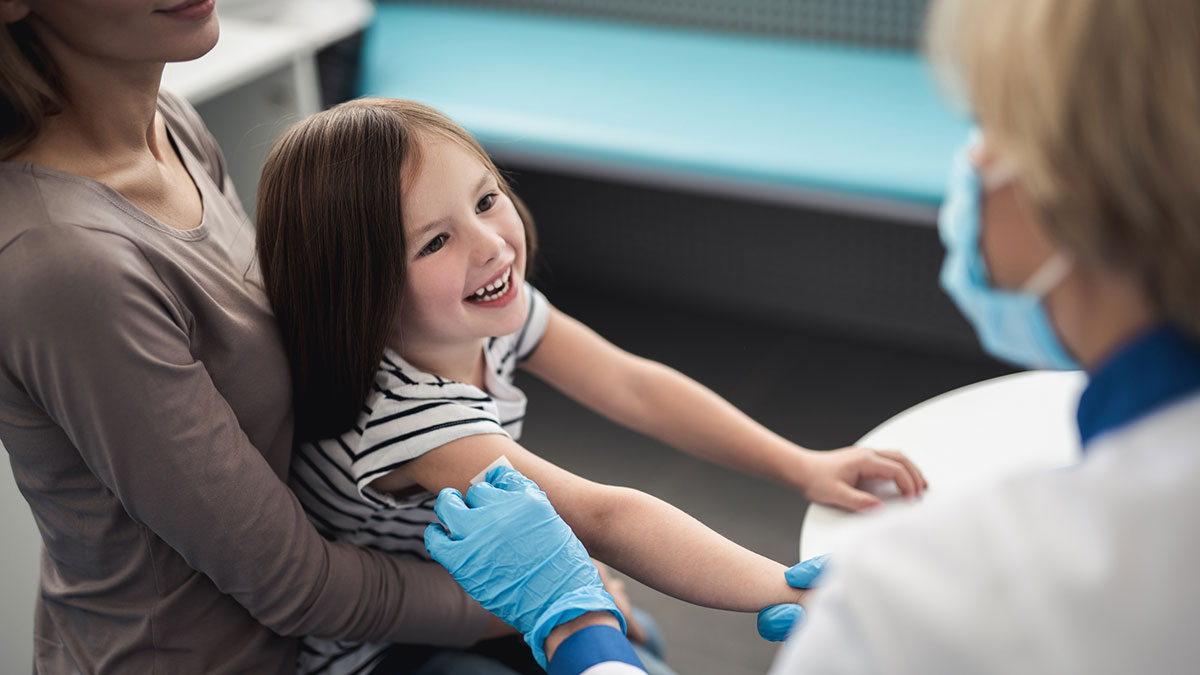Key points
- CDC recommends 2 doses of varicella vaccine for children, adolescents, and adults who do not have evidence of immunity.
- ACIP recommends people with no evidence of immunity should get varicella vaccine if they are exposed to varicella or herpes zoster.

Introduction
The varicella vaccines licensed in the United States are single-antigen varicella vaccine and the measles, mumps, rubella, and varicella (MMRV) vaccine. MMRV is only licensed for children 1 year to 12 years old. Help parents and caregivers make a decision on which vaccine their child should get.
This page summarizes CDC's current varicella vaccine recommendations. Access the official, full text below:
Evidence of immunity
Evidence of immunity to varicella includes any of the following:
- Documentation of age-appropriate varicella vaccination.
- For preschool-age children (age 12 months through 3 years): 1 dose
- For school-age children, adolescents, and adults: 2 doses
- For preschool-age children (age 12 months through 3 years): 1 dose
- Laboratory evidence of immunity or laboratory confirmation of disease.
- Commercial assays can be used to assess disease-induced immunity, but they lack sensitivity to detect vaccine-induced immunity (i.e., they might yield false-negative results).
- Commercial assays can be used to assess disease-induced immunity, but they lack sensitivity to detect vaccine-induced immunity (i.e., they might yield false-negative results).
- Birth in the United States before 1980 (should not be considered evidence of immunity for healthcare personnel, pregnant women, and immunocompromised people).
- Diagnosis or verification of a history of varicella or herpes zoster by a healthcare provider.
Verifying history of varicella
Healthcare providers should inquire about either:
- An epidemiologic link to another typical varicella case or to a laboratory confirmed case.
- Evidence of laboratory confirmation, if testing was performed at the time of acute disease.
People who have neither of the above criteria should not be considered as having a valid history of disease. For these people, a 2nd dose of vaccine is recommended if they previously received only 1 dose. If a healthcare provider verifies the diagnosis based on the above criteria, then vaccination is not needed.
Routine recommendations
Routine 2-dose vaccination
- First dose at 12 through 15 months old
- Second dose at 4 through 6 years old
Second dose catch-up vaccination
If the 2nd dose is administered after the 7th birthday, the minimum interval between doses is:
- 3 months for children younger than 13 years
- 4 weeks for people 13 years and older
People 13 years or older
MMRV vaccine is not approved for people in this age group, so use the single-antigen varicella vaccine.
Give 2 doses 4 to 8 weeks apart to adolescents and adult 13 years and older without evidence of immunity. If it's been more than 8 weeks since the 1st dose, the 2nd dose may be given without restarting the schedule.
Considerations for specific groups
Varicella vaccine is recommended for vaccinating people in specific groups who do not have evidence of immunity against varicella, including:
- People with HIV infection
- People with some degree of immunodeficiency
- Household contacts of immunocompromised people
- Postpartum and nursing mothers
- Healthcare personnel
Post-exposure vaccination
ACIP recommends that after being exposed to varicella or herpes zoster, people with no evidence of immunity and who are eligible for vaccination should get varicella vaccine.
- Ideally, the vaccine should be given within 3 to 5 days after the person is exposed. This may prevent varicella or make it less severe.
- Even if it has been more than 5 days, the vaccine should still be offered. This will provide protection against varicella if a person is exposed again in the future and the previous exposure did not result in infection.
People who previously got the first dose should get a second dose at the appropriate time interval.
There are no data available on the use of the combination MMRV vaccine for post-exposure vaccination.
Varicella vaccination is recommended for controlling outbreaks. People who do not have evidence of immunity should get a first or second dose as needed.
Additional resources:
Contraindications and precautions
Contraindications and precautions to vaccination generally dictate circumstances when vaccines will not be given.
- General Guidelines for Contraindications & Precautions
- Varicella Vaccine Contraindications & Precautions
In addition, MMRV vaccine is contraindicated for people with impaired humoral immunity (hypogammaglobulinemia, dysgammaglobulinemia) and HIV infection. Some people with contraindications for varicella vaccine may receive varicella-zoster immune globulin after being exposed to varicella or herpes zoster.
Resources
- Vaccine Safety (Chickenpox | MMRV)
- Vaccine Information Statements (Chickenpox | MMRV)
- Vaccination of thrombocytopenic children with MMRV vaccine (ProQuad®)
- Guidelines for administering antibody-containing vaccines
- Vaccines Web-based Training Course
- Immunization schedules (Child and adolescent | Adult)
- Vaccines For Children Program Information for Providers
Clinical information
